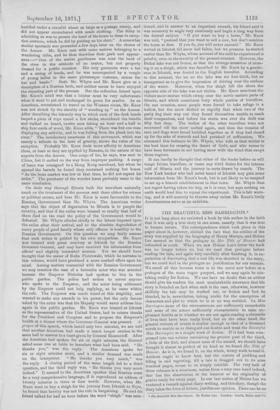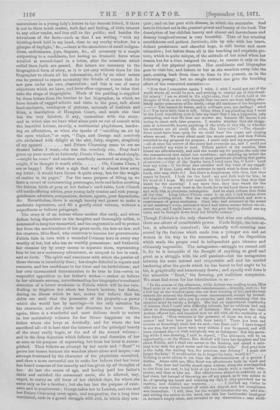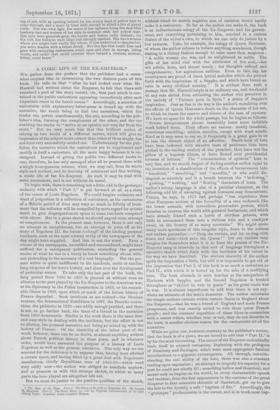THE BEAUTIFUL MISS BARRINGTON.*
Pr is not long since we reviewed a book by this author in the faith that it was only a true story in one sense, namely, that it was true to human nature. The correspondence which took place in this paper about it, however, elicited the fact that the outline of the story was supplied by the biography of Henry Martyn, and Hahne Lee assured us that the prologue to Her Title of Honour had intimated as much. When we saw Hohne Lee's letter the book was no longer before us, bat we read that prologue before reading the tale, and again very carefully after finishing it, in ex- Notation of discovering that a real life was sketelted in the story, but we could find in the prologue no justification for oar surmise. We recall all this because there is to the novel now before us a prologue of the same vague purport, and we may again be mis- taking reality for fiction. We can have no doubt that an author should give his readers the most unmistakable assurance that hia story is founded on feet when such is the case, otherwise, however skilfully the tale may be worked out, or fiction and fact be blended, he is, nevertheless, taking credit for the conception of characters and plot to which he is in no way entitled. In Aliso Barrington some of the circumstances are sufficiently remarkable and seine of the actors sufficiently characteristic to raise un- pleasant doubts as to whether we are not again reading a,chroniele of lives that have been really lived, but on the other hand, the general current of events is similar enough to that of a thousand novels to enable us to disregard our doubts and treat the Beautiful Miss Barringto n as a simple work of fiction. If it had been coin- pressed into one volume containing the greater part of the third, a little of the first, and Almost none of the second, we should have thought it almost as perfeet of its kind as we found Her Title of Honour. As it is, we found it, on the whole, weary work to read it. Authors ought to know bust, bat the custom of padding and filling in and repeating, till a tale is dragged out to its nine hundred pages, seems to us simply suicidal. The very look of
three volumes is a weariness, unless from a very rare hand indeed, that has the ohservatioa or the humour or the originality of genius reedy for every page. In our last notice of Helms Loo we ventured a remark against diary-writing, and this story, though the diary takes the form of letters, justifies our opinion. There can be no
,0 The bemeureil jibs Barrinoon, By Holum Los. London; Smith, Mae, and Or. naturalness in a young lady's letters to her dearest friend, if there is not in them much matter, both fact and feeling, of little interest to any other reader, and less still to the public; and besides the trivialneaa of the facts—sueli as that 1 am writing "with my blotting-book held in my hand, close to my murky window, for a glimpse of daylight," &c.,—there is the abundance of small indigna- tions, enthusiasms, joys, despairs, &c., all necessary to a simple outpouring to a confidante, but having no dramatic force when retailed at second-hand in a letter, after the occasions which called them forth are passed. But letters are necessary to the biographical form of story, as it is not easy without them for the biographer to obtain all his information, and by no other means can he pretend to report accurately the details of scenes that do not pass under his own observation ; and this is one of many objections which we have, and have often expressed, to tales that take the shape of biographies. Much of the padding is supplied by these letters from the heroine to her biographer, in which we have details of ragged schools and visits to the poor, talk about land-enclosure, catalogues of pictures, accounts of festivals and Mee, a deecription of Hampton Court, and much else that has the very faintest, if any, connection with the story ; and in which also we have what alone puts us oat of conceit with the beautiful heiress, namely, a sentimental playfulness, border- ing on affectation, as when she speaks of "carolling an air by the open window," or says, "Papa and George and somebody .else exclaimed with delight at the airy, fairy, elegant, simplicity of my apparel and Prince Charming came to see me dressed before I went,—he was the somebody else. Pray don't purse up your mouth so dubiously, Cousin Clare. Ho asked simply, —might he come ? and another somebody answered as simply, he might, if he thought it worth while Oh, Cousin Clare, I am so happy! But what a sigh that was! it almost blew away any letter ; it would have blown it quite away, but for the weight of Matter in its pages." For the same purpose of filling up we have a crowd of uninteresting personages, lords and ladies courting the heiress, birds of prey at her father's card-table, Low-Church .old maids offering advice, poor young-lady cousins and rich young- gentlemen admirers, companions, doctors, agents, poor dependents, .:Stc. Nevertheless, there is enough beauty and power to make a moderate reputation, and fill a goodly-sized volume, without a superfluous or tedious paragraph.
The story is of an heiress whose mother dies early, and whose father, being dependent on his daughter and thoroughly selfish, is interested to keep her unmarried, and too engrossed in self to protect her from the machinations of her great-uncle, the heir-at-law, and his creature, Miss Reed, who contrives to become her gouvernaute. Felicia falls in love with a wounded Crimean hero in every way worthy of her, but who has no worldly possessions ; and forthwith her enemies try by every means to separate them, representing him to her as a mercenary adventurer, as unequal to her in rank, and so forth. The spirit and sweetness with which she parries all these thrusts is inimitably done ; her simple disbelief in reports and rumours, and her confidence in her lover and his faithfulness ; and her own unconcealed determination to be true to him—even in
respectful opposition to her father's wishes makes us believe in her ultimate success, notwithstanding her biographer's confessed detection of a latent weakness in Felicia which will be her ruin. Failing to frighten her about her lover's motives, her father, during an illness which he bits, makes her believe that his debts are such that the possession of the property—a power which she would lose by marriage—is the only salvation for his character, and she yields and dismisses her lover. Here, again, there is a wonderful and most delicate truth to nature in her melancholy reliance for her future happiness on the rather whom she loves so devotedly, and for whom she has sacrificed all—it is here that the interest and the principal beauty of the story really begin, at the end of the second volume— and in the deep dejection which follows his cool desertion of her as soon as his purpose of separating her from her lover is accom- plished. Then follows an attempt by her uncle and " Reed " to prove her insane because she wanders about alone and mopes,—an attempt frustrated by the character of the physicians consulted, and then a more successful one to make her believe that her lover has heard rumours of her insanity and has given up all thoughts of her. At last she comes of age, and having paid her father's debts and satisfied the cormorant uncle, she is allowed, nay, urged, to marry an old lover of her childish days, for whom she cares only as for a brother ; but she has lost the purpose of exist- eence and is acquiescent ; George takes her to London, and she and her Prince Charming meet again, and temptation, for a long time tznresiated, ends in a grand struggle with evil, in which they con- quer ; and on her part with disease, in which she succumbs. And here in this last act is the greatest power and beauty of the book. The description of her childish beauty and almost sad devotedness and dreamy imaginativeness is very beautiful. That of her winning unselfishness and patient fortitude, side by side with her brave, defiant persistence and cheerful hope, is still better and more attractive ; but before them all is the touching and exquisite pic- ture, which is quite unique, of the attitude of her mind when her reason has for a time resigned its sway, to resume it only on the decay of her physical powers. Her confidante and biographer goes to visit her, and listens to her as she wanders away into the past, coming back from time to time to the present, as in the following passage ; but no single extract can give the touching
effect of time connected narrative :—
" Now that I remember again, I wish, I wish I could get out of the world where all would be now, and nothing to remind me of this dread- ful misery I I am so afraid in the night-time, that I clutch hold of the thought of God, as the only thought that can save me from falling abso- lutely under possession of the Devil,—that old madness of the Scriptures
—I You cannot do better, and it wit/leave you, my darling ! cried
You have faith that it will. Often when I am pleading that I trust in the Lord, something puts it into my heart that I am a hypocrite, only pretending, and that He does not answer me, bemuse He knows I am trying to cheat with false prayers. I wonder whether that old clergy- man at Ashencliffe knows anything of the trials of this life, or whether his sermons are all about the other, like fairy-tales ? '—The church- doors must have been open, for we could hoar the organ and singing where we sat. We were silent until the music ceased, and then Felicia reverted to my proposal for prayers. I could only nod nay acquiescence, —all at once the sorrow of the scone had overcome me, and I could not have steadied my voice to read. Felicia smiled at my emotion, then kissed me effectionately, and said she would say her prayer, the only one she remembered that suited her condition ; and standing up before the window the recited in a low tone of most passionate pleading that psalm of sorrows Out of the depths have I cried unto the, 0 Lord : Lord hear my voice : 0 let thine ears consider wall the voice of my suppli- eatione. If thou, Lord, wilt be extreme to mark what is done amiss: 0 Lord, who may abide it ? But there is forgiveness with thee, that thou mayst be feared. I look for the Lord : my soul doth wait for him: in his word do I hope. My soul waitoth for the Lord more than they that watch for the morning! I say more than they that watch for the morning. 0 my soul, trust in the Lord, for in the Lord there is mercy; and with him is plenteous redemption. And he shall redeem thee from all thy sins.' Long bolero Polices, Daum to an end, I had broken down and wee sobbing aloud. But Rho was perfectly abstracted, and wore a countenance of great exaltation, Carr, who had returned at the sound of her mistress's voice, intimated that I had bettor escape before she ob- served me, and I made haste to go lest my poor darling should see my tears, and be brought down from her blissful ecstasy."
Though Felicia's is the only character that wins our admiration, there are others of considerable power. Uncle Ralph, the heir-at- law, is admirably conceived ; the naturally well-meaning man soured by the fortune which made him younger son and set women in his way to the succession, and by the disposition which made the proper road to independent gaiu irksome and ultimately impossible. The antagonism—struggle we cannot call it, for he is incapable of the thought of anything so good and great as a struggle with his evil passions—but the antagonism between his more natural and respectable self and his morbid hankering after the goods which he has learnt to feel ought to be his, is graphically and, humorously drawn ; and equally well done is the miserable "Reed," the fawning, yet malicious companion. We must find room for her introduction to us
"In the course of the afternoon, while Arthur was reading to me, Miss Reed stole in on our quiet fireside entertainment,—literally, stole in ; for a low tap on the window-pane was our first warning of her, and the next minute she entered the drawing-room unannounced, except by herself. 'I thought I should take you by surprise,' said she, assuming that the surprise must be surely a delight. She had an impertinent familiarity of manner that I could with difficulty tolerate, but no coldnese had any effeet in discouraging her airs of intimaoy. She accepted the chair Arthur offered her, and inquired how we did with all the cordiality of a dear friend. Haw welcome is the presence of those we love at this season.! and how have you both been lately ? There his been sad trouble at Stoneleigh since last we met,—has there not ? I have longed to see you, but you know very, very seldom I can be spared, and will have excused the,—I wish everybody was as indulgent! But this morn- ing while I was dressing, I said to myself, "The afternoon will be an opportunity,—at the Manor, Mrs. Bothell will have her daughter and her sweet Policia, and I shall run across to the Rectory, and spend a sale- tary hour with the good rector and his nice little wife." And pray hew is the baby, the darling boy, the precious, woe Johuny? I must not forget the baby ! It would never do to forget the baby, would it?" . . . Nothing is more odious to me than the affeetionitteness of a person I dislike. Alone with me, Miss Reed was affectionate both in word and deed. The door had hardly closed upon Arthur, wheu she was impelled to rise from her seat, to lay hold of my two hands with a tender vehe- mence, and then to kiss me. Her effusiveness abated as suddenly as it emeant d m e ttt cloc had risen, but instead of throwing me off my guard, as it was do, of opening my heart and relaxing my lips, iounviiytoparomvy visitor ok
caution, and doubled my wariness
take her warm velvet bonnet off while she stayed, and her compliance was immediate. '1 will, dear, for the weight incommodes me, said she; and suiting the action to the word, she laid her fashionable head-gear in Arthur's empty chair, and revealed to my observation a neat skull-
cap of net, with an opening behind for her scanty knot of yellow hair to come through, and a space in front wide onongh to admit a tier of gauzy curls. She was very ugly, the worst of her ugliness being the clay-blue leathery tint and texture of her skin in contrast with her yellow hair. Her eyes wore greenish-grey, the brows and lashes redly defined; for the rest, her features were largo and strongly marked. She was a woman whom you might hate easily, but whom. if you undertook to despise her, you must despise with a latent dread. For the lips that could kiss and purr with oarnoying enthusiasm could open and shut in savage, biting words, and under that stolid exterior there burned a restless, envious, bitter, cruel heart."
































 Previous page
Previous page